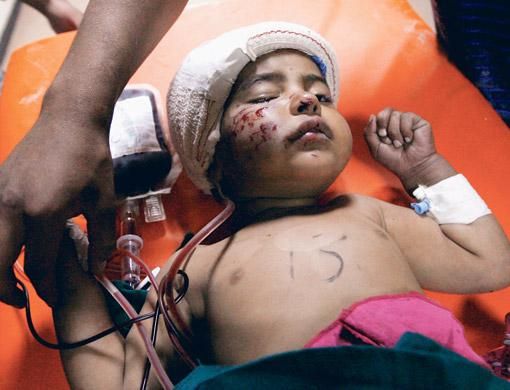Baghdad: It's been a season of jarring flashbacks in Iraq - a spate of major suicide bombings, including more than 145 dead over two days of bloodshed capped by a blast on Friday outside a Shiite shrine.
The spike in attacks since March suggest suspected insurgents are still capable of striking back hard and recruiting fighters even as the Pentagon increasingly shifts its attention to Afghanistan.
The violence also bring wider questions about the ability of Iraqi security forces to control a resilient insurgency led by Al Qaida in Iraq and how that could influence the US military withdrawal timetable - the next step calls for American forces to leave bases inside cities by the end of June.
There's been more than a dozen significant bombings or suicide attacks in the past two months, including a series of five blasts in four hours in Baghdad on April 6 that left 37 people dead.
On Friday, at least 70 worshippers were killed in twin suicide bombings at Baghdad's most important Shiite shrine.
A day earlier - the bloodiest single day in Iraq in more than a year - at least 88 people died in suicide blasts in central Baghdad and at a restaurant filled with Iranian pilgrims north of the capital.
The aftermath of the Friday blasts were scenes that many in Baghdad had hoped would never return on this scale - deep pools of blood, dozens of limp bodies scattered in the dirt and crumpled against walls, survivors wailing and many of the estimated 125 wounded crying for help.
"It is just like a massacre took place," said Laith Ali, 35, who owns a shop near the targeted shrine.
"Where are the security precautions that the security officials are talking about?" he asked.
April is already the deadliest month in Iraq this year with at least 349 Iraqis killed in war-related violence.
Suicide bombings - about half the deaths this month - have not taken such a toll on the Iraq population since February 2008.
Casualties have been on the rise since January, which had been the least deadly month for Iraqis since AP started keeping track in May 2005.
However, war-related deaths remain well below levels of a year ago.
A total of 1,276 people died violently in March 2008, compared with 335 killed last month.
"I don't think we're seeing a lot of assessments at the moment from either the military or other assessments to suggest that it's very likely that there will be any return to the darkest days of late 2006, early 2007," said Colin Kahl, a deputy assistant defence secretary, on Wednesday.
However, the attacks in Baghdad take a special toll. Security in the capital is essential to keep Iraq's government functioning and project some sense of stability.
Residents also had slowly started to gain confidence that the worst days could be over as they watched stores reopen and crews dismantle some concrete blast barriers.
"To prove that (the insurgents) are still alive... they need to continue orchestrating attacks in the centre (of Baghdad)," said Farhana Ali, a regional policy specialist and former US government counterterrorism analyst.
"We've now seen a spate of attacks to the prove the lethality of Al Qaida in Iraq," he said.
Assessing militancy threat a tough test for government
Baghdad: In March, the insurgent umbrella group believed linked to Al Qaida, the Islamic State of Iraq, announced a new offensive called 'Good Harvest' after denouncing what it claimed was an alliance between the West and mostly Shiite Iran.
Assessing the strategies and strength of Iraq's insurgency is notoriously difficult. Various factions, including Al Qaida in Iraq, are believed to wage attacks, and any level of coordination is unclear.
"The insurgents are trying to send a message," said John Pike, director of GlobalSecurity.org, which follows security and defence issues.
"Every month that went by without a major crisis is another month that they appear to be marginalised. They are telling everyone: 'The Americans are pulling back and the Iraq security forces are going to have deal with us now.'"
That will remain the question as the US military prepares to pullout.
Prime Minister Nouri Al Maliki ordered a military task force to investigate the Friday bombings at the Shiite shrine and ordered commanders responsible for security in the area to be relieved of duty during the probe, said military spokesman Major-General Qassim Al Moussawi.
However, Iraqi forces - dominated by Shiites - will be asked for much more than guard duty on specific sites. Full-scale security efforts will fall on their shoulders, including areas where Al Qaida maintains a foothold.












